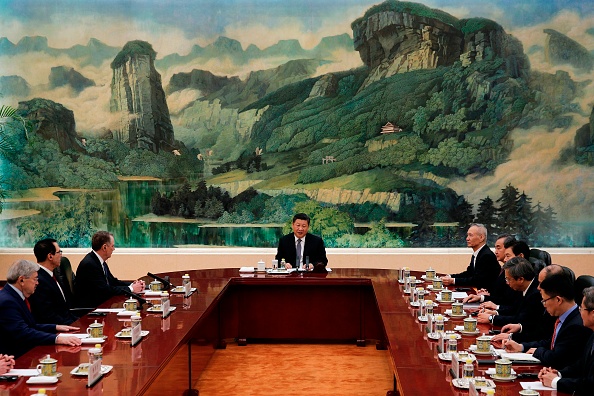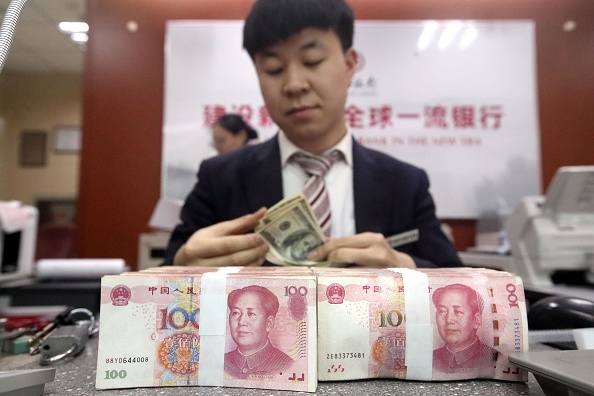
 Trade Talks, Round 3: Waiting for Trump-Xi?
Trade Talks, Round 3: Waiting for Trump-Xi?The third round of US-China trade talks were "productive," according to US Treasury Secretary Steven Mnuchin, although no clear resolution has been made to end the protracted trade war. The most recent trade talks, which concluded in Beijing this Friday, resulted in pledges to increase purchases of US goods, including $200 billion of US semiconductors over six years, but made questionable headway on 'structural issues' long contested by US lawmakers, which include "forced technology transfer, intellectual property rights, cyber theft, agriculture, services, non-tariff barriers, and currency," according to the White House.
Washington is also calling on Beijing to discontinue what it alleges are large government subsidies for Chinese sectors that compete with US industries, such as the advanced manufacturing industry. One source familiar with the negotiations said that Beijing is only proposing "cosmetic, non-impactful offers," while resisting US calls for structural reform.
Beijing hasn't been completely resistant, however. In addition to Beijing's pledge to make a record-breaking purchase of 5 million tons of soybeans during last month's trade negotiations in Washington, Beijing also introduced stronger-than-expected intellectual property protection reforms in a surprise draft of its foreign investment law, signaling a willingness to compromise on certain structural issues.
Steven Mnuchin and US Trade Representative Robert Lighthizer also met with President Xi Jinping Friday Friday afternoon, mirroring Chinese Vice Premier Liu He's meeting with President Trump last month. However, analysts believe that the trade talks are just preliminary measures until the two presidents can meet. "You have to wonder if all of the positive talk just a way to manage expectations and the stock market when everyone knows this won't be resolved until Trump and Xi meet," said Jeff Moon, a U.S. trade negotiator in the Obama administration.
While tariffs on $200 billion of Chinese goods were originally set to increase from 10 percent to 25 percent on March 2nd, President Trump tweeted this week that there was a possibility to extend the deadline for 60 days to come up with a solid deal.
 Starting the New Year with a Bang
Starting the New Year with a BangComing off the Lunar New Year holiday period, China's economy showed new signs of strength, with combined sales of retail and catering enterprises rising 8.5 percent year on year to a new high of 1.01 trillion yuan (about 150 billion U.S. dollars) from Feb. 4 to 10, according to the latest statistics from the Ministry of Commerce. The upturn comes after Chinese markets suffered prolonged declines in an overall slowing economy amid the US-China trade war and other economic challenges, including the recent crackdown in shadow banking.
China's banks lent record-breaking amounts of RMB at 3.2 trillion RMB ($477 billion) for January 2019, surpassing the previous high of 2.9 trillion RMB in January of last year. Some analysts see the massive lending as a way to jumpstart stagnating investment and cushion a cooling economy, while others see this as a signal that "credit growth is starting to bottom out in response to monetary policy easing," according to Julian Evans-Pritchard, senior China economist at Capital Economics. But this news should be welcomed by policymakers, who have been fighting to get more money into China's private sector. To free up more money for lending, the People's Bank of China (PBoC) has reduced the baseline amount of money that banks are required to set aside in reserves five times over the last year.
Despite China's slowing economy and the trade war, US investment into China more than doubled last month, with an increase of 125%, with the high-tech industry in particular seeing a marked jump in foreign investment.
 Wandering into Sci-Fi Success
Wandering into Sci-Fi SuccessIn cultural news, China's first big-budget sci-fi movie "The Wandering Earth" was released on February 5th (the first day of Lunar New Year) and immediately began climbing box offices. Bringing in 3 billion yuan ($443 million) in less than 10 days, "The Wandering Earth" is set to be one of the highest-grossing films in China's history. The movie, based off the award winning author Liu Cixin, tells a story in a future where Earth is confronted with annihilation from a rapidly expanding sun. After the world's governments face a failed attempt to eject Earth out of orbit, a group of Chinese astronauts endeavour to save Earth from an imminent death.
"It's a genre that most Chinese people have never seen, and it really touched people," said Wu Jian, a Beijing-based film analyst with Alibaba Pictures. China's movie industry will continue to soar, according to industry insiders, and is expected to become the world's largest cinema market in the future. Analysts see China's entrance into the sci-fi industry as a signal of China's prospects towards becoming a scientific superpower in real life.
Chinese science is "coming of age," as China-US Focus contributor Phil Cunningham puts it. In December, China became the first country to land a rover on the dark side of the moon, while China's Huawei strives to break records in the world of 5G mobile communications. Although illegal and heavily criticized, even scientist He Jianku broke records by bringing about the world's first genetically edited babies. "China is proving fertile ground for science fiction, stoking a hunger for scientific wonder at a time when China has invested heavily in technology and science," writes Cunningham.
Prepared by China-US Focus editorial teams in Hong Kong and New York, this weekly newsletter offers you snap shots of latest trends and developments emerging from China every week, while adding a dose of historical perspective.
- 2019-02-08 Welcoming the Pig
- 2019-02-02 The Final Countdown: One Month Until Trade Talks Deadline
- 2019-01-26 How Slow Will it Go?
- 2019-01-18 Countdown to Trump-Kim: Round Two
- 2019-01-11 Kim Jong-un Visits Beijing
- 2019-01-04 Cross-strait tensions mount on anniversary
- 2018-12-21 Xi’s 40th Anniversary Speech
- 2018-12-14 Post-G20 Detentions & Tech Tensions
- 2018-11-30 Trump and Xi Set to Face Off at the G20
- 2018-11-26 Xi Strengthens Alliances in Preparation of G20
- 2018-11-16 World Leaders Meet at ASEAN and APEC Summits to Discuss Economic Strategy
- 2018-11-09 US and China Hold Delayed Diplomatic and Security Dialogue
- 2018-11-02 Presidents Xi and Trump Talk Possible Trade Deal
- 2018-10-26 With U.S. Pressure, China and Japan Grow Closer
- 2018-10-19 Secretary Mattis Meets Chinese Counterpart in Singapore
- 2018-10-12 Trump and Xi May Meet at the G20
- 2018-10-05 U.S. Vice President Articulates Hard Line on China in Speech
- 2018-09-28 A Turbulent Week For China-U.S. Relations at the UNGA
- 2018-09-21 China Will Not Purposefully Devalue the Yuan, Premier Li Keqiang Says
